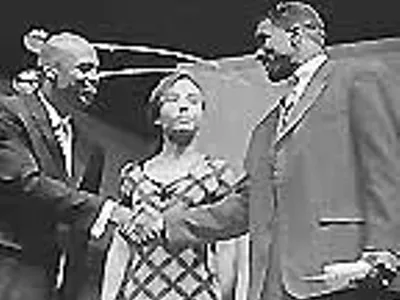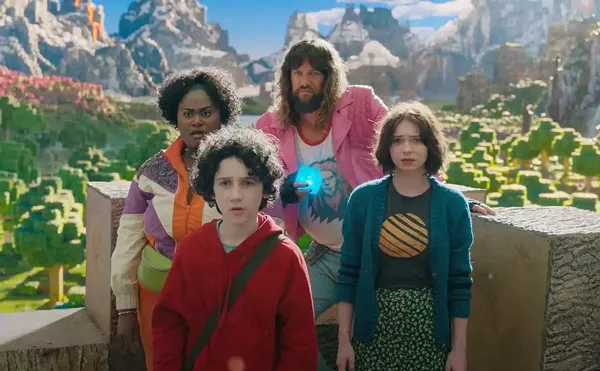I am sitting on a beach long after nightfall. The blackness is so complete, the humid air so thick, it seems as if I am completely alone, washed up on the shores of a primordial land. I forget that I'm a tourist on the Outer Banks of North Carolina about to witness the re-enactment of the arrival of the first English settlers to America. Instead I imagine it's 1587, and I'm taking my first footsteps on the shores of my new home. As I see the dark shadows of the dense trees ringing the beach, I am filled with terror and regret. How am I to survive? Where will I live? What will I eat? Suddenly, a loud whoop shatters the silence. The lights come up and actors depicting Croatoan Indians dance in a harvest celebration. As a colonist, I would have found the ceremony both beautiful and frightening. After months at sea, the smell of venison on the fire would have been enough to make me faint. Without knowing whether they were friend or foe, I know I would have entered the Croatoan encampment -- my survival would have depended on it.
The play, "The Lost Colony," has been performed on Roanoke Island every summer for 60 years. It tells the story of Queen Elizabeth's first attempt to permanently colonize the so-called New World with a series of expeditions bankrolled by her government and Sir Walter Raleigh. But after only a few years, the colony mysteriously disappeared. Historians fill in the blanks this way:
The Croatoans were members of a vast confederation of Algonquin-speaking tribes (which included the Virginia Powhatans of Pocahantas fame). A peaceful people, they welcomed Raleigh's ship in 1584, teaching the settlers how to hunt and gather food in the thick North Carolina forest.
But when a third ship arrived in 1587 with 117 men, women and children, trouble was not far behind. One of the settlers was found murdered near the fort, and the ship's captain feared that the friendly Croatoans had turned hostile. The Croatoans denied the charges, blaming the Powhatans for the murder. The captain ordered retaliation against the Powhatans, but his men attacked the Croatoans instead.
After that, relations between the settlers and their benefactors grew strained. The colonists had repaid their kindness with bloodshed. But the Croatoans did not retaliate with force. Instead, they retreated, excluding the settlers from the major dividend of communal living: access to food.
Cut off from nourishment and supplies -- and with the winter encroaching -- the desperate colonists sent back to England for help. But then fully engaged in a war with Spain, England could not respond to the stranded colonists for three years.
It's not clear if bitterly cold weather, starvation or war wiped out the settlers, only that the undersupplied, overwhelmed colonists were no match for all three. By the time English supply ships returned in 1590, the colony had vanished. The only hint of what happened was the word "Croatoan" carved in a nearby tree. While some think that the colonists were all murdered, many believe that the Croatoans eventually took pity on the desperate colonists and took them in, completely assimilating them into native culture.
This is not the story that has survived the sieve of national memory. Instead, we celebrate another encounter between Native Americans and English colonists in New England 40 years later. It was then that an English-speaking Pawtuxet named Squanto befriended the Pilgrims at Plymouth. Squanto, who had escaped from Europe where the Spanish held him as a slave, is credited with saving the lives of the Pilgrims. He taught them the medicinal properties of plants, how to smoke and preserve meat and how to fertilize crops. In gratitude, the Pilgrims held a three-day feast, said to be the first Thanksgiving.
As a child, I thought of how gracious the Indians were to share so freely of their Thanksgiving turkey, corn and sweet potatoes, pumpkin, fry bread, maple sugar and roasted pecans. But now I realize that the natives did not offer their knowledge of hunting and farming to the Pilgrims out of sympathy, largesse or even the deification of the pale newcomers. It is the essence of the native philosophy that bounty belongs to everyone or no one. It would be pretentious to roast venison for your family while your neighbor starved.
Individual wealth was measured by what you had to give away. Honor was earned with a generous heart. When it came to food, the native people were in a perpetual state of thanksgiving.
But their philosophy did not bleed into the dominant culture despite the fact that we've celebrated their generosity for nearly 400 years. Today, food is the sword with which we force nations to submit to our will (Iraqi embargo) and reward nations that succumb to our wishes (Russia food-aid package). Those who can afford it can have all they want. Those who have no money risk starvation in the richest nation on the planet.
The lights went down on the North Carolina beach, leaving open the fate of the English settlers. I thought about the small mound nestled in the forest -- all that still remains of the lost colony. I wondered if its 100 inhabitants died of starvation. Or had they in their desperation pleaded with the Croatoans for mercy and eventually assimilated into the native notion of community?
I'd like to think it's possible that even as their rescuers set sail from England in the late 1500s, the first colonists and the Croatoans already were living as a family, celebrating their third Thanksgiving.






